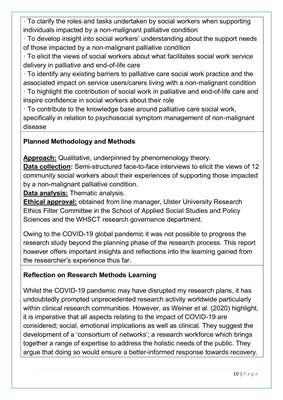
10 | P a g e
· To develop insight into social workers' understanding about the support needs
of those impacted by a non-malignant palliative condition
· To elicit the views of social workers about what facilitates social work service
delivery in palliative and end-of-life care
· To identify any existing barriers to palliative care social work practice and the
associated impact on service users/carers living with a non-malignant condition
· To highlight the contribution of social work in palliative and end-of-life care and
inspire confidence in social workers about their role
· To contribute to the knowledge base around palliative care social work,
specifically in relation to psychosocial symptom management of non-malignant
disease
Planned Methodology and Methods
Approach: Qualitative, underpinned by phenomenology theory.
Data collection: Semi-structured face-to-face interviews to elicit the views of 12
community social workers about their experiences of supporting those impacted
by a non-malignant palliative condition.
Data analysis: Thematic analysis.
Ethical approval: obtained from line manager, Ulster University Research
Ethics Filter Committee in the School of Applied Social Studies and Policy
Sciences and the WHSCT research governance department.
Owing to the COVID-19 global pandemic it was not possible to progress the
research study beyond the planning phase of the research process. This report
however offers important insights and reflections into the learning gained from
the researcher's experience thus far.
Reflection on Research Methods Learning
Whilst the COVID-19 pandemic may have disrupted my research plans, it has
undoubtedly prompted unprecedented research activity worldwide particularly
within clinical research communities. However, as Weiner et al. (2020) highlight,
it is imperative that all aspects relating to the impact of COVID-19 are
considered; social, emotional implications as well as clinical. They suggest the
development of a 'consortium of networks'; a research workforce which brings
together a range of expertise to address the holistic needs of the public. They
argue that doing so would ensure a better-informed response towards recovery.
Reflecting on the current level of research activity, whilst encouraging, has also
prompted questions around the quality of some research being produced. There